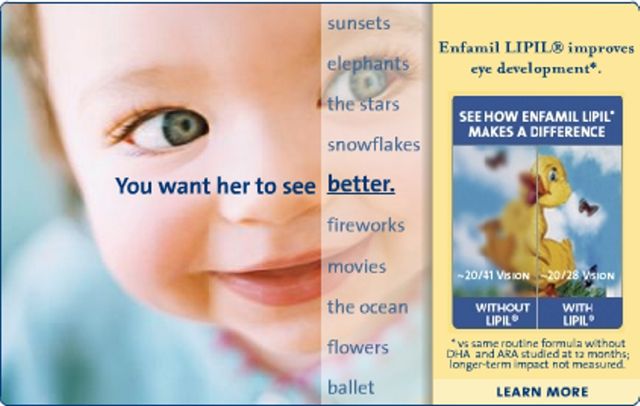European MEPs campaign to stop claims and formula ads

BOGUS HEALTH CLAIMS
Our campaign to stop promotional claims on foods for infants and young children came to a head in March 2011 with a vote in the EU Parliament. 328 MEPs from all parties (a majority) tried to stop the following claim appearing on follow-on formulas: “DHA intake contributes to the normal visual development of infants up to 12 months of age.” However, because 57 MEPs were not present, an absolute majority was not reached so the claim could not be stopped.
Glenis Willmott MEP, who led the challenge said:
“Today a majority of this parliament voted against this health claim. Clearly it is a disappointment not to get the number of votes we needed, but this result still sends a strong message that there is deep unease about health claims of this sort.”
UNICEF & Save the Children joined the many NGOs and researchers around the world who opposed the claim. The World Health Organisation clarified its position about DHA:
“WHO does not have a recommendation about the addition of docosahexaenoic acid (DHA) to formula milk.....to date no solid evidence exists to be able to say that adding DHA to infant formula will have important clinical benefits. Were WHO to give such a recommendation, it would have to follow a strict guideline development process based on grading of all available evidence collected through systematic reviews by expert panels free from conflict of interest.”
CONFLICTS OF INTEREST & SCIENCE
The DHA debate helped MEPs understand our concerns about the scientific evidence used in the authorisation of claims and our worries about the European Food Safety Authority (EFSA), the European Commission and the lack of transparency in EU policy formation generally. Not only did members of the EFSA Working Group evaluating the claim have unacceptable conflicts of interest, but EFSA admitted that it could not have reached its conclusion “without considering the studies claimed by the applicant as proprietary.” No wonder when no consistent, independent and systematically-reviewed evidence of a causal relationship for DHA fortified formulas exists.
EFSA has since carried out a review of its policy on conflicts of interest and the new rules address many of our concerns. However EFSA’s role, its Management Board (one of whom has worked for the Danone Institute for 10 years) and the claims approval process are embedded in a complex mix of EU regulations geared to promoting EU trade and tricky to fix.
http://info.babymilkaction.org/EFSA
A CHANCE TO CHANGE THE RULES
A Framework Directive called PARNUTs that has governed baby food policy making for two decades will soon be replaced by a new Regulation which will abolish the concept of ‘Dietetic Foods’. With MEPs we are calling for more transparency, accountability and protection of child health. The call from Green MEP Carl Schlytter that: “Advertising of infant formulae, follow-on formulae and of any other kind of food intended for infants or young children shall be prohibited.... “ did not get through, but MEPs are still hoping to extend the controls on infant formula advertising to follow-on formulas and to allow Member States to restrict or prohibit all advertising.
Discussions are continuing with a Plenary vote expected in Strasbourg in April. Do check this weblink to see how you can help.
http://info.babymilkaction.org/parnuts






